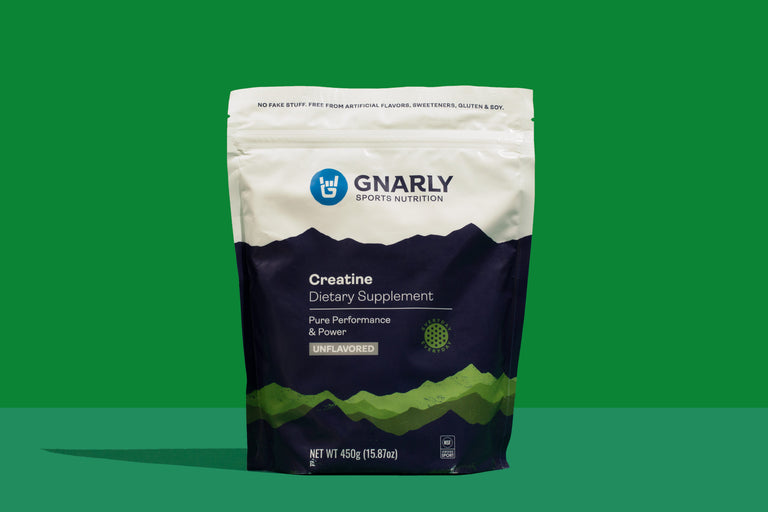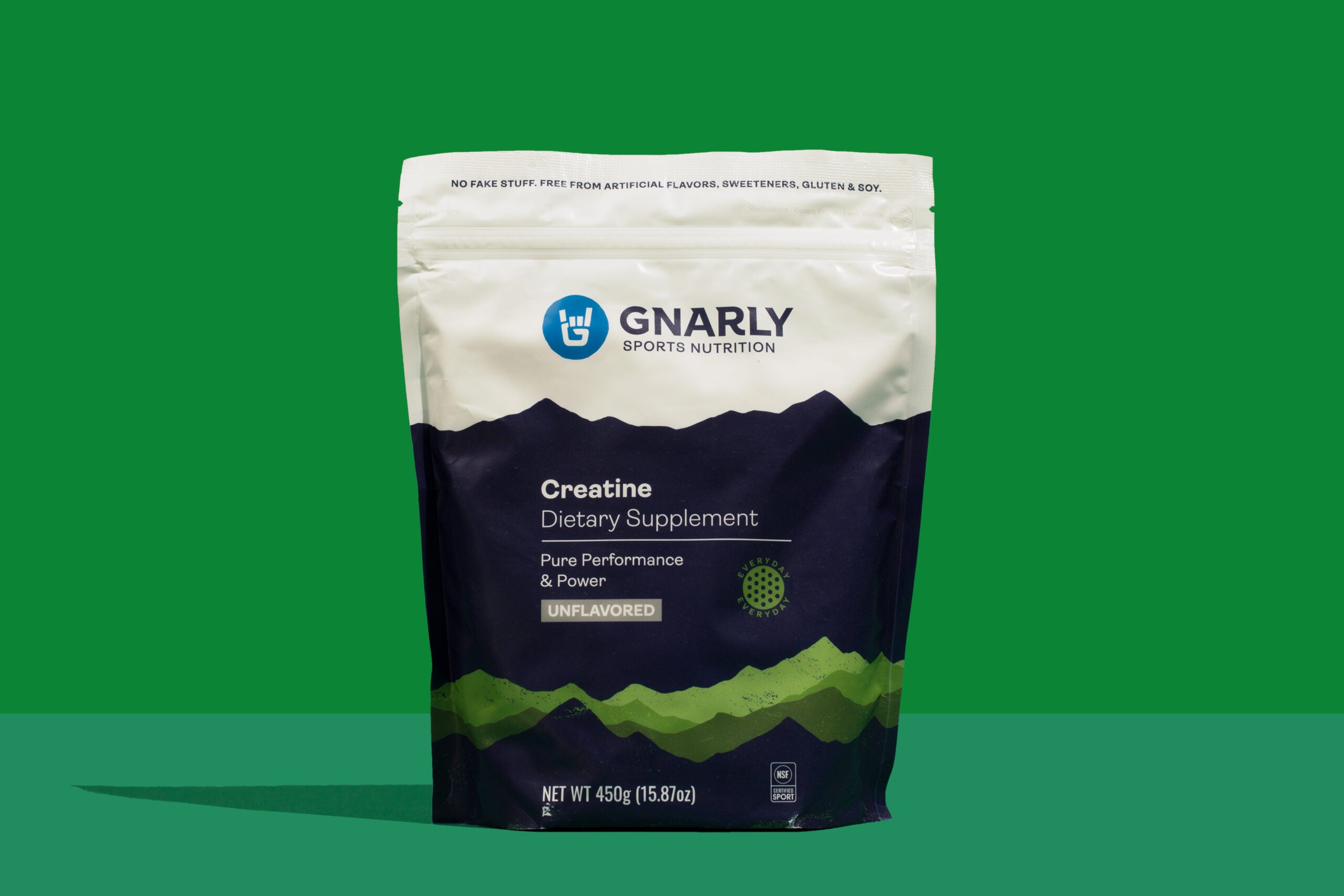Creatine is one of the most-researched sports nutrition supplements and is known for its ability to enhance high-intensity exercise capacity, power, and lean muscle mass. However, researchers are also looking at the ability for creatine supplements to positively impact brain health.
Creatine and brain function
The brain is the highest consumer of energy in the human body, after muscles. In fact, the brain uses about 20% of your calorie intake, plus it runs 24/7, demanding a constant supply of energy! Just like muscles, information messengers called neurons – present in the brain and elsewhere – require energy to carry out important functions using electrical impulses and chemical signals <1>. The brain uses significant amounts of ATP to maintain membrane potentials and signaling capacity. Because creatine regenerates ATP, it plays an important role in normal brain function <4>.
Research shows that exogenously administered creatine (i.e. creatine supplementation) increases energy supply to neurons in healthy adults. Creatine can be both transported into the central nervous system from the periphery through the blood brain barrier, as would happen with creatine supplementation, but neurons can also endogenously synthesize creatine from amino acids <1>.
Interestingly, the idea that creatine can contribute to brain health came from research on genetic creatine storage disorders, which are characterized by mental dysfunction including global developmental delay and intellectual disability. Researchers found that the effects of some – but not all – creatine storage disorders were improved following creatine supplementation <2>.
What research says about creatine and brain function
A systematic review of randomized controlled trials looking at creatine supplementation and its effects on cognitive function found that creatine supplementation may improve short-term memory and intelligence/reasoning. While inconsistencies in some studies were found, especially considering other areas of cognitive function such as attention, executive function, and mental fatigue, it’s speculated that there would be differences in the impact of creatine on cognitive function because of differences in diets. For example, vegans and vegetarians tend to have lower creatine stores and may benefit from creatine supplementation more than meat eaters, which is consistent with creatine use for physical performance <1>.
It’s also believed that creatine supplementation may be more effective for improving brain health in situations characterized by brain creatine deficits because of acute stressors (e.g. exercise and sleep deprivation) or chronic, pathologic conditions such as the creatine storage disorders, aging, or mild traumatic brain injury <7>.
The optimal dosing of creatine to elicit a response in brain function is unknown and further research is needed, although it’s believed that higher and prolonged dosing than what is used for increasing muscle creatine stores may be required <3>.
Additionally, researchers are looking at the use of creatine in improving symptoms of depression, and a number of small clinical trials have reported positive outcomes. Researchers believe that the mechanism behind creatine’s role in depression may be that it improves brain energy storage, transport, and utilization. Studies have looked at creatine use both in conjunction with prescription medications (e.g. SSRIs) and the sole use of creatine in individuals who did not experience improvements with prescription medications <9>.
Creatine and traumatic brain injuries
Traumatic brain injuries can occur due to a violent blow or jolt to the head or body and can lead to short-term and long-term effects. A concussion is considered a mild traumatic brain injury and is a common sports injury. Recovery from mild traumatic brain injuries typically involves rest, while more severe traumatic brain injuries may require medical intervention.
Unfortunately, traumatic brain injuries can cause long-lasting effects, including cognitive impairment. Because creatine is more likely to exert an effect in situations where cognitive processes are stressed, there is some evidence that increased brain creatine may be helpful for reducing the severity and enhancing recovery from mild traumatic brain injuries <3>.
Limited data on human subjects is available in this area, but it has been hypothesized that creatine’s neuroprotective effects may be helpful post-traumatic brain injury by way of maintaining mitochondrial function in the brain <4>. Known as the “powerhouse of the cell,” mitochondria are highly depended upon by the brain, and a single neuron can contain hundreds to thousands of them <5>.
Other nutrition strategies for concussions
Nutrition is extremely important after any injury as the body needs adequate energy to recover. Now is not the time to diet, and you may even choose to increase your protein or overall calorie needs regardless of activity level.
To support your brain during recovery, fill your plate with nutritious, anti-inflammatory foods such as dark leafy greens, blueberries, extra virgin olive oil, and walnuts, and limit your intake of highly processed foods or inflammatory foods such as fried food, added sugar, and alcohol.

Omega-3 fatty acids – particularly DHA – is a widely supported nutritional intervention after concussions or mild traumatic brain injuries. DHA, or docosahexaenoic acid, is found in central nervous system membranes and is the main omega-3 fatty acid found in the brain. In animal studies, traumatic brain injuries reduce DHA in the brain. It’s known that a change in DHA composition of membranes in the brain can affect brain function, including neuroplasticity – which impacts learning and memory – and neuroinflammation <6>. Foods high in DHA include fish such as mackerel, salmon, herring, and sardines, and you can also use supplemental forms of DHA.
Additionally, resveratrol is a potent antioxidant with neuroprotective benefits and has been found to improve oxidative stress in the brain following traumatic brain injury <8>. You can find resveratrol in grapes and wine, though alcohol itself should be avoided during recovery. Supplemental forms of resveratrol may be useful, though you should always consult with your doctor before supplementing your diet.
Because there is not yet an optimal protocol for using creatine for brain health, you can follow the standard 3-5g/day dose to support brain health or recovery from a mild traumatic brain injury.
Of course, the best way to handle traumatic brain injuries is to avoid them in the first place by practicing safety and wearing a helmet wherever applicable! But thankfully, research is emerging that will help individuals recover more adequately from unavoidable accidents, and creatine may play a major role in this.
references
- Avgerinos, K. I., Spyrou, N., Bougioukas, K. I., & Kapogiannis, D. (2018). Effects of creatine supplementation on cognitive function of healthy individuals: A systematic review of randomized controlled trials. Experimental gerontology, 108, 166–173. https://doi.org/10.1016/j.exger.2018.04.013
- Joncquel-Chevalier Curt, M., Voicu, P. M., Fontaine, M., Dessein, A. F., Porchet, N., Mention-Mulliez, K., Dobbelaere, D., Soto-Ares, G., Cheillan, D., & Vamecq, J. (2015). Creatine biosynthesis and transport in health and disease. Biochimie, 119, 146–165. https://doi.org/10.1016/j.biochi.2015.10.022
- Dolan, E., Gualano, B. & Rawson, E. (2019) Beyond muscle: the effects of creatine supplementation on brain creatine, cognitive processing, and traumatic brain injury, European Journal of Sport Science, 19:1, 1-14, DOI: 10.1080/17461391.2018.1500644
- Institute of Medicine (US) Committee on Nutrition, Trauma, and the Brain; Erdman J, Oria M, Pillsbury L, editors. Nutrition and Traumatic Brain Injury: Improving Acute and Subacute Health Outcomes in Military Personnel. Washington (DC): National Academies Press (US); 2011. 10, Creatine. Available from: https://www.ncbi.nlm.nih.gov/books/NBK209321/
- Rango, M., & Bresolin, N. (2018). Brain Mitochondria, Aging, and Parkinson’s Disease. Genes, 9(5), 250. https://doi.org/10.3390/genes9050250
- Gupta, A., Summerville, G., & Senter, C. (2019). Treatment of Acute Sports-Related Concussion. Current reviews in musculoskeletal medicine, 12(2), 117–123. https://doi.org/10.1007/s12178-019-09545-7
- Roschel, H., Gualano, B., Ostojic, S. M., & Rawson, E. S. (2021). Creatine Supplementation and Brain Health. Nutrients, 13(2), 586. https://doi.org/10.3390/nu13020586
- Shi, Z., Qiu, W., Xiao, G., Cheng, J., & Zhang, N. (2018). Resveratrol Attenuates Cognitive Deficits of Traumatic Brain Injury by Activating p38 Signaling in the Brain. Medical science monitor : international medical journal of experimental and clinical research, 24, 1097–1103. https://doi.org/10.12659/msm.909042
9. Kious, B. M., Kondo, D. G., & Renshaw, P. F. (2019). Creatine for the Treatment of Depression. Biomolecules, 9(9), 406. https://doi.org/10.3390/biom9090406






